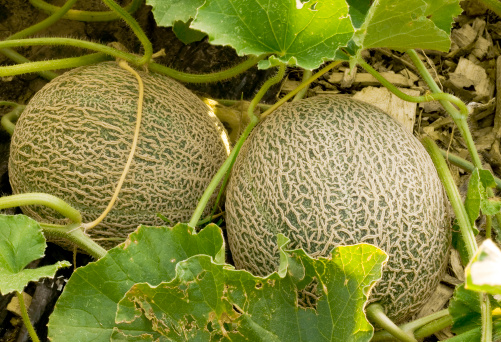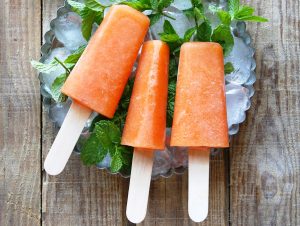Cantaloupes are a delicious, juicy fruit! Get the health benefits of the carotene in cantaloupes and much more in your snacks today. Also, note that it is one of the fruit superfoods.
6 Health Benefits of Cantaloupes
1. Are an Excellent Source of Carotene
Researchers measured the carotenoid contents of six California-grown cantaloupes and found that the beta-carotene content was almost 30 times higher than the content of fresh oranges. Still, carrots have the highest amount of beta-carotene.
What is Carotene (AKA Beta-Carotene)?
- a yellow/orange/red pigment found in some fresh fruits and vegetables
- is converted into vitamin A which is an essential vitamin
- carotenoid are an antioxidant.
The Many Benefits of Carotene – Foods containing carotenoids can give us get many protective health benefits.
Zea-xanthin is a carotenoid that is responsible for antioxidant and protective UV light-filtering functions in the eye. Carotenoids have been found to delay some destructive processes in the eyes which lead to macular degeneration. Severe vitamin A or vitamin C deficiency can lead to macular degeneration; eating cantaloupe is a great way to help prevent it from developing.
- Boosts Immunity
Carotenes found in cantaloupe have been found to boost the immune system and prevent infections according to research. Other studies have indicated that beta-carotene can improve the function of immune cells and can be very useful in cancer too.
- Protects Eye Health Including Macular Degeneration
Cantaloupes are full of nutrients that are protective for eye health (beta-carotene, Vitamin A, Vitamin C, lutein, and zeaxanthin). - Reduces Diabetes
Diets high in β-carotene and α-carotene were found in a study to reduce Type 2 diabetes. - Mortality Goes Down
There were seven studies with 149,774 people which clearly showed that a high intake of beta-carotene was connected to a reduced risk of all-cause mortality. - Reduces Risk of Colon Cancer
Diets high in carotenoids were found to be associated with a lower risk.
“Cucumis melo[musk melon, or cantaloupe] has been shown to possess useful medicinal properties such as analgesic, anti-inflammatory, anti-oxidant, free radical scavenging, anti-platelet, anti-ulcer, anti-cancer, anti-microbial, hepato-protective, diuretic, anti-diabetic, anthelmintic and anti-fertility activity.” ~ International Research Journal of Pharmacy
2. Keeps you hydrated
The high water with electrolytes makes cantaloupes a great snack during the hot summer months which will prevent dehydration and help keep you cool.
3. Great for Body’s pH Level
They are one of the alkaline foods; they help bring the pH level of the body back to a balance.
4. Aids With Weight Loss
A cup of cantaloupe has only 60 calories, is high in water and is nutritious which is good for part of a weight loss plan.
5. Helpful for Body Detox
It is rich in electrolytes which help the body to detox, ridding it of excess water. Also, helps balance water in the intestines so you don’t become dehydrated, stopping diarrhea from happening.
6. Assists Digestion
It is a hydrating fruit, with a high percentage of water which helps the digestive system which needs to be hydrated, to move toxins along. Being a melon it is easy to digest.

Please Note:
Listeria and Cantaloupes
The rough outer skin of the cantaloupe is susceptible to contamination, trapping bacteria that can enter the inner fruit. Also, it is best to purchase organic cantaloupes, because they are often are sprayed with five of the longest-lasting chemicals.
Do take some extra care when cutting it:
- Make sure it is not bruised or damaged
- Wash it in water using a scrub brush, just before cutting.
- Refrigerate cut cantaloupe within two hours
- After cutting, wash the cutting board, knives, and utensils well.
- Always, cut off the stem end; research says that is where the most bacterial contamination can be.
History
- The oldest reference to cantaloupes is 2400 B.C. in Egypt according to the University of Illinois.
- In 1494 Christopher Columbus brought them to North America, during his second trip to the New World.
Cantaloupe Nutrition
One cup has only 54 calories, 270 mg Vitamin A (120% DV), 59 mg Vitamin C (108% DV), potassium, and B vitamins including thiamine, niacin, folate, as well as vitamin K, magnesium, and fiber. For the full details go to Cantaloupe Nutrition
Interesting Cantaloupe Trivia
- It has the most beta-carotene in the melon family.
- The name cantaloupe was named after an Italian village called Cantalupo.
- There was a worldwide search for a better strain of penicillin and it was found in the spores of the skin of a moldy cantaloupe in 1941.
- It is the most popular melon in North America.
- California grows 75% of the cantaloupes in the US.
How to Select the Best Cantaloupe
They are often picked when they are unripe so they do not get damaged while being shipped.
Find a ripe one:
- First, pick it up and feels its weight. It should feel full and heavy.
- Now, tap on the cantaloupe to hear the sound it makes. If it sounds is dull and deep, it is a ripe cantaloupe. If it sounds hollow, it probably is not ripe.
- Next press gently on the top (where the stem was of the cantaloupe) with your thumb, if it gives way slightly it is perfect. If it feels soft it is likely overripe.
- Finally, make sure that there is no bruising or damage.
Other Tips
- A ripe cantaloupe rind usually will be cream-colored or yellow or golden. An unripe rind of cantaloupe will contain some green or gray. (Although this is not always true so do not rely on this way of assessing its ripeness)
- When you smell the bottom of a cantaloupe, an unripe one will have a faint scent or none at all. Ripe ones will have that distinctive cantaloupe aroma; if the fragrance is strong, it may be overripe.
Store it
- Place a ripe cantaloupe in the crisper of the refrigerator and it will last for three to four days.
- An unripe one is best left out at room temperature for a few days to ripen and be softer and juicier.
- Never wash a ripe or unripe cantaloupe while it is whole and uncut. You will not be able to dry it well and the problem is that its surface will absorb moisture during washing. The moisture will increase mold forming thus lessening its shelf life.
- Only wash the whole cantaloupe just before cutting, thus there will be little risk of mold forming.
- When it is fully ripe it must be refrigerated.
Tips for Eating
Cut it up or scoop it out with a ball maker and make a salad with them and watermelon and honeydew melon.
Cantaloupe seeds make a good snack food. First wash the seeds in a fine mesh wire strainer, rinsing under cool running water while removing the pulp fibers. After they have been cleaned and drained place the seeds on a cookie sheet and lightly roast them at 160-170°F in the oven for 15-20 minutes.
Here are Some Delicious Cantaloupe Recipes:

Cool Cantaloupe Popsicles – Sugar-Free – a very healthy popsicle for you and your children and they are easy to make.
Sweet Cantaloupe Smoothie For a Hot Day – super simple and yummy smoothie recipe.
100+ Superfoods
Learn more about some of the healthiest vegetarian foods you will always want to have in your pantry or growing on your deck.
READ: Superfoods – Over 100 of the Healthiest Foods You Should Have in Your Diet and learn more about the variety of Superfoods we think you should have in your diet.

